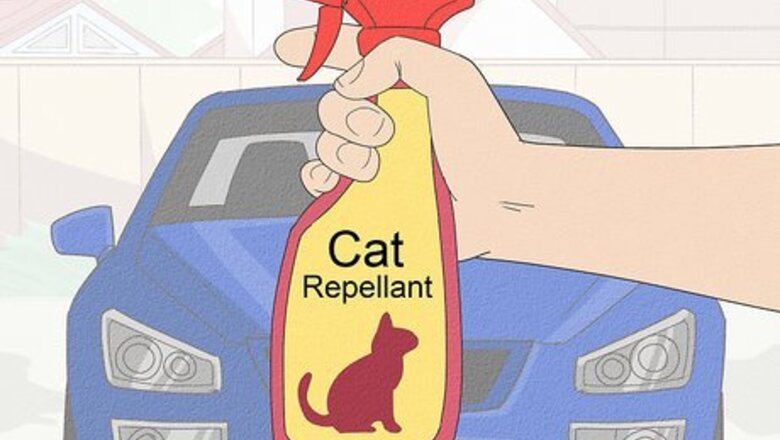
views
- Use natural repellents, including cat repellent spray, dried lavender, rue, rosemary, or thyme, cayenne pepper, and white vinegar.
- Install a motion-activated sprinkler or ultrasonic repeller to scare the cat away when you're not there. Otherwise, protect the vehicle with a car cover.
- Clear any food scraps away from the car so cats won’t smell them. Park your car in a garage or shaded area whenever possible to deter cats.
Use cat repellent spray.
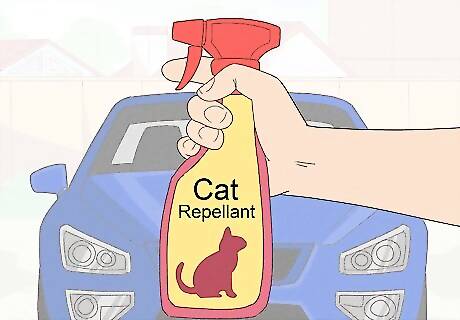
Cat repellent spray is designed to smell bad to cats, keeping them away. Pick an all-natural cat repellent spray, and start by spraying the ground around your car. If the cat continues to sit on your car, spray around the edges of the car, on the bumper, and on other non-corrosive areas. Re-apply the repellent weekly to keep the cats away. An all-natural repellent shouldn’t hurt your car’s paint, but it’s best to spot-test on an inconspicuous part of your car before you spray a repellent on painted areas. Make your own repellent spray if you prefer. Fill a spray bottle with 200 millilitres (6.8 fl oz) of water and mix in 20 drops of citronella oil. Shake it well and spray the repellent around your car and on the tires, but not painted areas. You can also use other essential oils for this homemade spray, including lavender, peppermint, or orange. Experiment with different essential oils until you find one that works best!
Sprinkle cat repellent powder on the car.
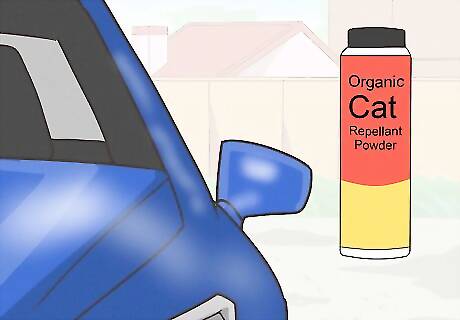
The powder is harmless, and its smell repels cats when applied to your car. Find an organic, chemical-free cat repellent powder that's safe to use around children, plants, and other household pets. Cat repellent powder works just like spray; sprinkle it around your car, and if that doesn't work, sprinkle it over the car's hood and body. Keep in mind that powder is more easily blown away. Re-apply it weekly and after there’s wind and rainy weather.
Spread dried herbs over your car.
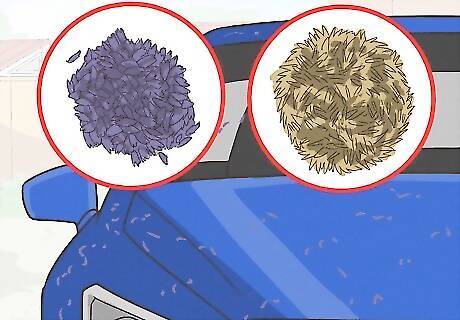
Cats don't like the smell of dried lavender, rosemary, rue, and thyme. Sprinkle your dried herb of choice over the hood of the car and any other areas the cat regularly sits. Try switching between several herbs to see what works best, or use a mixture with each application. Start with a small amount of herb and increase it if the cat continues to sit on your car. Herbs are also inexpensive and easy to use, but like powder, they can be blown off by winds. Be sure to re-apply the herbs whenever they get blown off your car!
Use cayenne pepper as a repellent.

Cayenne pepper has a long track record of keeping cats away. Sprinkle the cayenne pepper in a circle around your car—no need to apply any directly onto the vehicle. It might take a couple of days before things change, but cats don't like the pepper and will soon leave. Plus, cayenne pepper is completely natural without being smelly, so you won't have to think about it between applications. Re-apply the cayenne pepper every week and keep using it, even after it seems like the cats have left. If the cats return, increase the amount of pepper you sprinkle around your car to drive them away again.
Spritz white vinegar around the car.
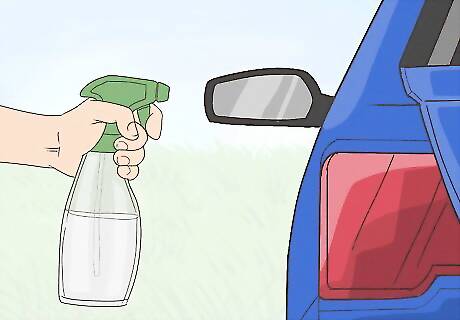
Cats avoid an area when they catch the scent of white vinegar. Spray white vinegar in a circle around the car to keep cats away, and re-apply the vinegar every few days to ensure it keeps working. You can do this with straight, full-strength vinegar or dilute the vinegar before using it (meaning you add just as much water to the bottle as you add vinegar). If you dilute the vinegar with water, you can also spray it directly onto your car. White vinegar isn't harmful when applied in small amounts!
Leave a few orange peels in the area.

Cats dislike the scent of citrus and won't stick around if they smell it. Use a sharp knife to peel a few oranges. Then, scatter the peels on the ground around your car to make cats avoid the area. When they smell the orange, the intruding cat will likely look for a more comfortable place to sit. Don't put the orange peels directly on your car; the acidity of the orange can damage your car's paint.
Install an ultrasonic repellent.
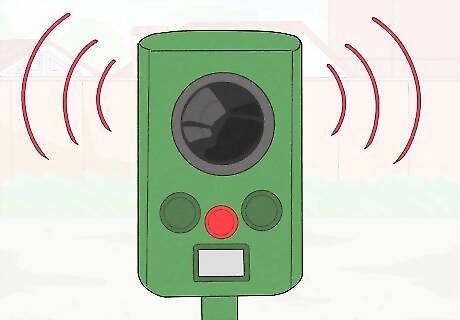
Ultrasonic devices make sounds that cats don't like but you can't hear. Pick up an ultrasonic cat repeller (they're typically quite affordable) and set it up within range of your car according to the packaging. When the electronic repellent senses motion, it'll emit a high-pitched sound that will cause the feline to run off—with no harm done to the cat or your car. An ultrasonic repellent can protect your car from rodents and other pests since it's motion-activated. In a pinch, activate your car alarm; the loud noise will make a cat run away. Just be careful about activating it when other people are sleeping if you have neighbors!
Use motion-controlled sprinklers.
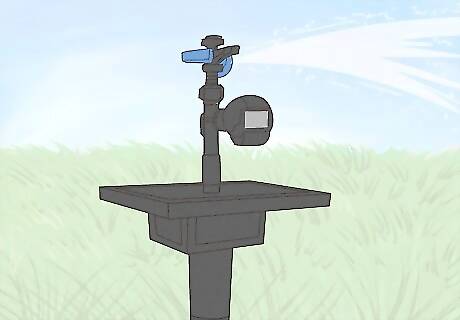
Cats hate being splashed with water. A motion-activated sprinkler is built specifically to deter feline pests; just hook a sprinkler up to your hose and point it at your car. Any time it detects motion, it'll spray a big arc of water to scare off the cat. Any cats in the area won't want to come near your car once they realize they'll get splashed every time. Keep in mind that your car will get wet in the process, so roll up your windows beforehand and avoid walking in front of the sprinkler (or you might get sprayed too).
Cover up your car while it's parked.
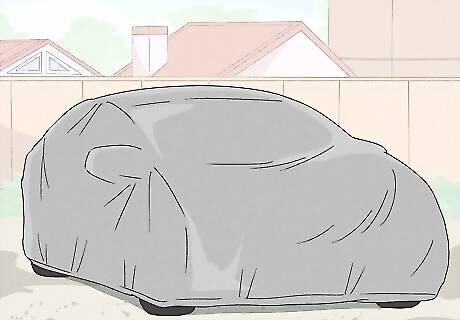
A cover can protect your car's paintwork from cat claws. You don't necessarily have to scare the cat away if you don't mind them sleeping on your car. Instead, use a car cover to stop the cat from leaving paw prints or scratches on the vehicle; just place the cover over your car every night before you go to bed. Car covers are safe options that won't scare or harm the cat—a helpful alternative to repellent. Car covers can also be a little expensive, but they're worth the investment as they protect your car from cats and lousy weather.
Clear food scraps away from the car.
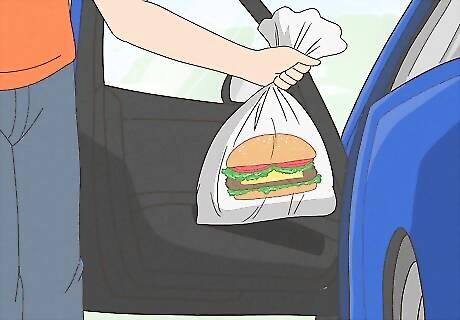
Cats will be drawn to your car if they can smell food inside or around it. Check your car for stray food wrappers or stray snacks left behind—it's common to toss a fast food wrapper to the side and forget about it. Remove all the food and wrappers from your car; if the cats can’t smell food anymore, they’ll likely search for dinner elsewhere. Clean up your driveway and yard to ensure the cat isn't attracted to food scraps falling from your trash.
Trim the cat's nails.
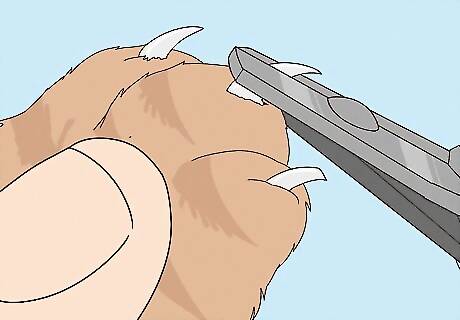
When the cat's nails are kept short, they can't scratch your car. If the cat in question belongs to you, trim their nails every 2 to 3 weeks using feline nail clippers. You'll minimize the damage your cat can do without scaring them or changing their outdoor routine. If the cat isn't yours, talk to their owner about trimming their nails. Trimming isn't the same as de-clawing a cat. De-clawing isn't recommended because it's painful for the cat and considered inhumane; outdoor cats need their claws for hunting and protection.
Train your cat to sit somewhere else.

Create a new sunbathing spot and reward cats with treats for using it. Coax the cat away from your car by setting up a sandbox or an outdoor cat tree for sunbathing. Then, train your cat to sit there by rewarding them with treats when they sit on the tree or perch. In time, the cat will learn that the perch you’ve given them is the best option. Training your cat requires you to be outside watching them for at least some time. If you don't have time for that, consider a different option. Jackson Galaxy Jackson Galaxy, Cat Behaviorist Outdoor cats are naturally curious and may be attracted to climb on or under vehicles. By understanding root motivations behind this behavior and providing suitable alternatives, cat guardians can redirect this impulse through positive reinforcement training and environmental modification.
Discuss a solution with your neighbor.
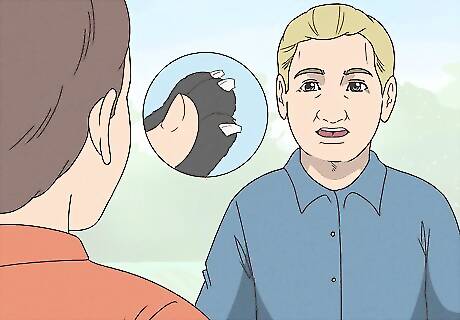
Politely ask if they can trim the cat's nails or keep it indoors more often. If the cat doesn't belong to you, talk to their owner. Explain the problem politely, let your neighbor know that you'd like to find a solution together, and offer a few ideas, such as keeping the cat's claws trimmed or keeping them indoors at night. Manage the conflict collaboratively; if you get angry, they might get defensive and refuse to help. If you'd like your neighbor to trim their cat's claws, say something like, "I know it's not your fault that Willow likes to sit on my car, but she's damaging the paint with her scratches. Would you be open to cutting her nails?" If you want the cat to be kept indoors, try, "I know you can't control exactly where he goes, but I was wondering if you'd be willing to restrict Milo to your backyard or keep him indoors at night. He's been damaging the paint on my car." To clarify that you're willing to work with them, add, "If you have any other solutions, I'd be willing to discuss those as well."
Park in a different spot.
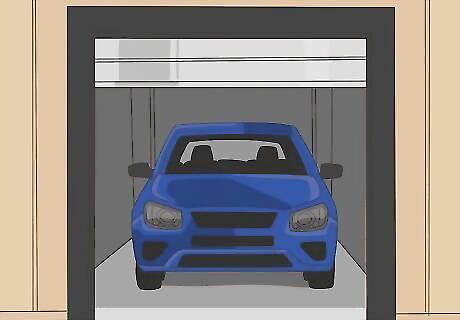
Parking in a garage or a shaded spot on the street will deter cats. If nothing else, simply park your car in a different location to stop the cat from seeing it (and sitting on it). Keep the car in a garage if you have one. If not, park the car in the shadiest spot you can find—whether in a driveway or on the street. Cats sit on car hoods so they can sunbathe, so the cat won't be so interested if there's no sun.
















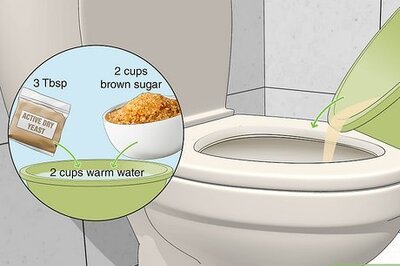



Comments
0 comment